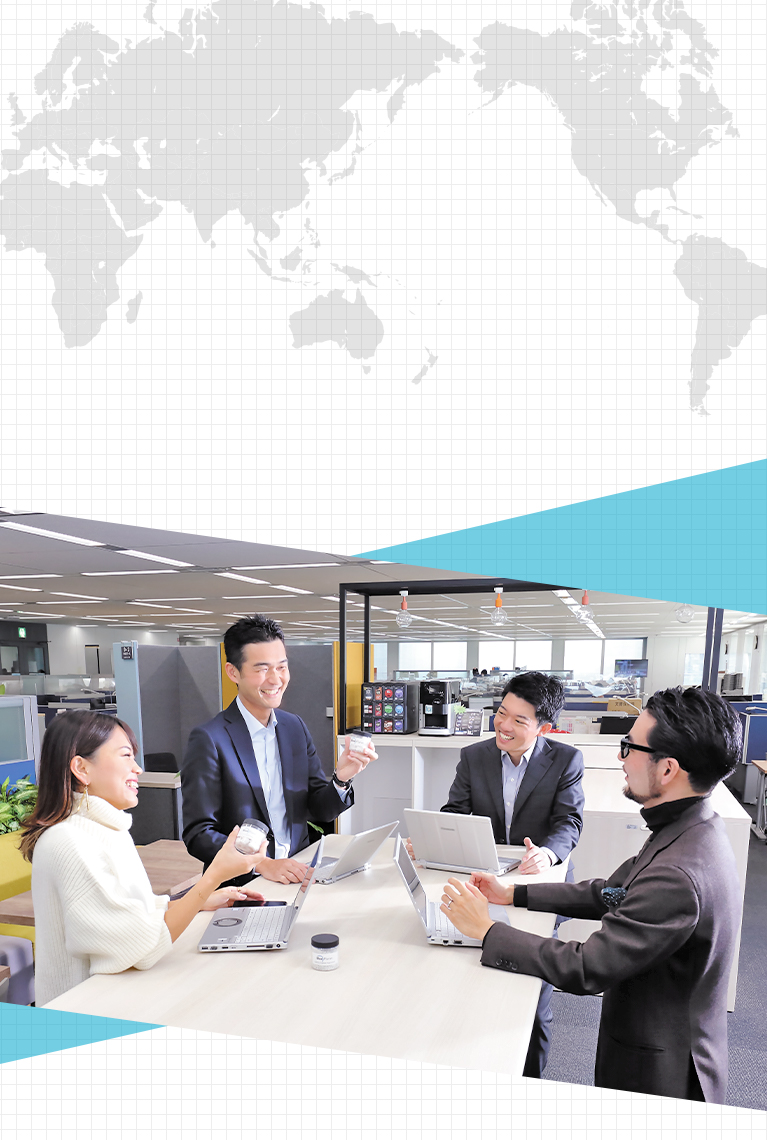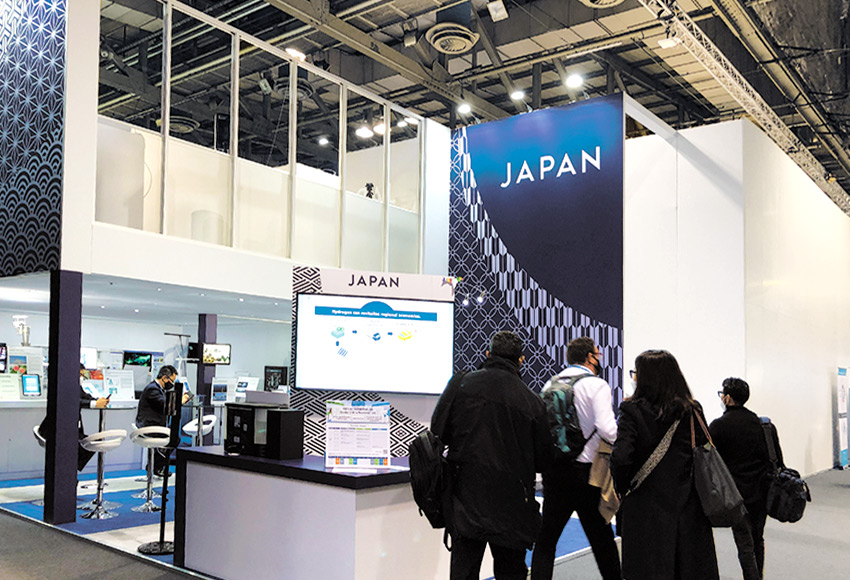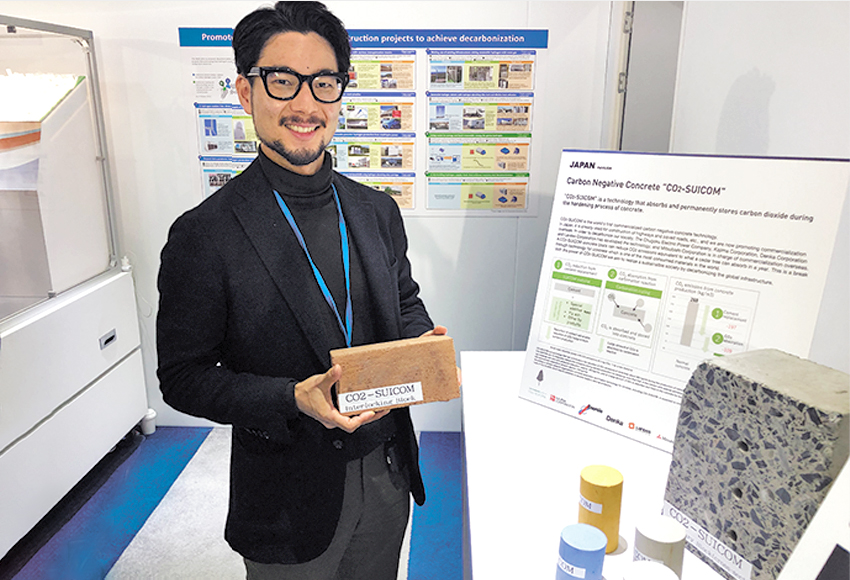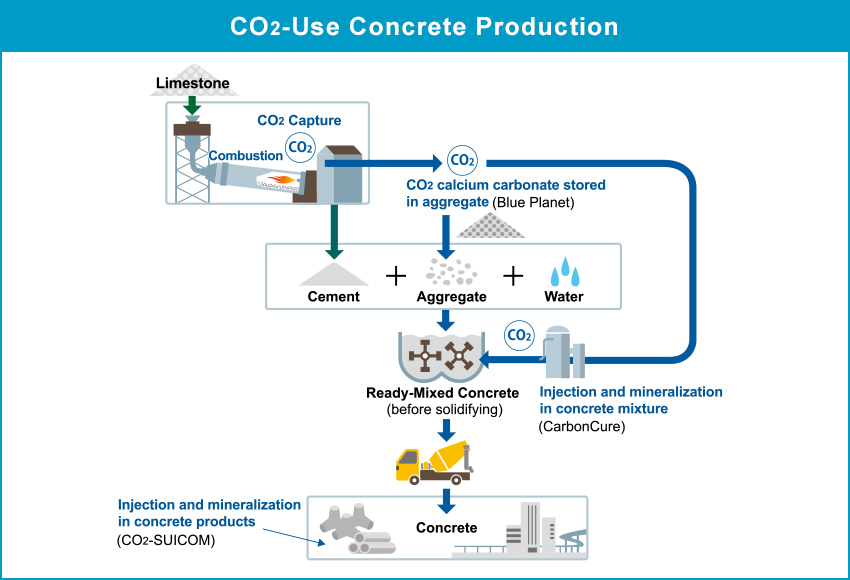Vol.8 MC's CCU Task Force


Vol.8
MC's CCU Task Force
A Company Challenge to Make Effective Use of CO2
Acknowledging its own responsibilities to help realize the global ambition of carbon-neutral societies, Mitsubishi Corporation (MC) unveiled its roadmap to carbon neutrality in October 2021.
The roadmap sets down targets to halve MC's greenhouse-gas emissions by fiscal year 2030 (compared to its fiscal-year-2020 levels) and be a net-zero emitter by the year 2050. It also covers MC's pledge to invest two trillion yen(about 15.6 billion dollars at the latest rate) in energy-transformation (EX) projects by fiscal year 2030, as well as the company's aim to help create future societies through the joint pursuit of advances in both EX and digital transformation (DX). To achieve that aim, MC is focusing on a number of new technologies, one area in particular being carbon capture and utilization (CCU), which is referred to in Japan as "carbon recycling."
One of MC's greatest strengths is its multi-industry connections, and it has leveraged that strength to launch its "CCU Task Force," a cross-Business-Group initiative that is dedicated to identifying new commercial opportunities in CO2-producing environments. In this, the eighth installment of our latest series, we spotlight an energetic team of professionals who are positioning themselves at the forefront of the decarbonization movement.

CCU technologies were even featured at COP 26 in 2021.

CCU technologies were even featured at COP 26 in 2021.
Pooling Global Know-How
A Simple Chat Room Launches a Bold Initiative
CO2 has many intriguing applications. That emitted from industries can be used as a raw material to make fuel, and it can even be injected into concrete to form solid carbonates, which can strengthen the material. If we truly hope to decarbonize our societies, then we must not settle for just cutting back CO2 emissions. We must also grasp the potential of CO2 as a new resource and develop both new ways to use it and the technologies to turn it into new businesses. This is where CCU comes in. Japan's carbon-recycling industry is currently taking advantage of CO2 to create products and promote research and development in a variety of fields, including fuels, construction materials, and synthetic fibers.
Recognizing both the environmental and economic potential of these technologies, the young employees at MC were quick to launch their CCU Task Force. What began as a voluntary "chat room" for those keen to share ideas on decarbonization has since evolved into an advanced and diversely skilled project team, whose members include both company executives and employees from various Business Groups and divisions.
To Yusuke Tsuji, a task-force member who hails from MC's Mineral Resources Group (pictured second from left in the above photo), decarbonization is analagous to mixed martial arts.
"Achieving net-zero societies is an aim shared by countries and businesses all over the world, and it will demand a variety of different approaches," he says.
Tsuji explains that promoting electrification through the spread of EVs and other means is one such approach, as is power producers shifting towards cleaner energy sources, but right now his team is concentrating on CCU.
"Carbon recycling has a lot of promise, but more work needs to be done for it to truly catch on," he adds.
Tsuji describes how MC's presence, resources and expertise as a sogo shosha have connected it to myriad industries, and how its know-how and experience has been developed and honed on the world stage.
"If you have a question about a certain business or industry, a quick call to the right MC department will connect you to an expert. Our task force is proud to be comprised of many such experts, pros who have excelled in so many different fields, are privy to the latest intelligence, and have the knowledge needed to succeed. We are working as a team to combine and deepen our expertise and nurture new businesses in the process."
The swell to promote businesses that are invested in decarbonization is gathering momentum at MC. The "chat room" that triggered it has grown into a massive community of more than 800 employees, which is now the driving force behind MC's place in the move to decarbonize.
Developing Eco-Friendly Construction Materials
At the Forefront of a Promising Future Industry
At present, MC is concentrating its CCU operations in two broad areas, namely "construction materials" and "fuel chemistry." The project team is particularly focused on the former, where it is examining the use of CO2 in concrete production. Due to the heavy demand for construction materials, the impacts of CO2 reduction in that industry are significant, and unlike fuel-chemistry operations, no hydrogen is needed to inject CO2 into concrete, meaning that the operations can likely be commercialized earlier. MC is envisioning fuel-chemistry projects more as businesses that it can pursue over the medium to long term, while in the meantime it keeps track of developments in green and blue hydrogen.
Steps are already being taken by MC to make CO2 construction material businesses a reality, one of which was forming a capital and business alliance with CarbonCure Technologies, a Canadian company headquartered in Halifax, Nova Scotia. CarbonCure's technology injects CO2 into concrete during mixing, at which point it chemically converts into a calcium-carbonate mineral. The CO2 is effectively turned into rock, which not only strengthens the concrete, but also does so without incurring any additional production costs. MC plans to work with CarbonCure in leveraging this technology to develop environmentally friendly concrete production techniques.
Although concrete is a convenient and widely used construction material, a great deal of CO2 is emitted during its manufacturing. In fact, concrete production accounts for roughly 6% of all CO2 emissions resulting from societal activity, which is why demand for "green buildings" built with low-carbon concrete is growing in western nations. As it works with CarbonCure, MC is also pursuing collaborations with another developer of CCU technologies, the American firm Blue Planet Systems.
Tie-ups with Japanese enterprises are in the works too. In November 2021, the 26th UN Climate Change Conference of the Parties (COP 26) was held in Glasgow, Scotland. Members of MC's task force attended the Green Zone exhibition, where they introduced an eco-friendly concrete called "CO2-SUICOM" that was developed in Japan. The concrete uses a special admixture and less cement, which is responsible for the CO2 emitted during concrete manufacturing. Furthermore, by separately capturing and mineralizing CO2 as it is being made, CO2-SUICOM can actually be a carbon-negative material. It is already being used in the construction of buildings, roads, curbs and other infrastructure, and its development has also been selected as a grant project by Japan's New Energy and Industrial Technology Development Organization.
"Technologies that can make good use of CO2 tend to be the stuff of dreams, but if we can figure out how to affordably mass produce these kinds of carbon-capture concretes, then we will have succeeded in protecting the natural environment and creating a wholly new market in the process," says Yusuke.
We are certainly getting hints that CCU businesses may be feasible. According to a recent report by the International Energy Agency, CCUS operations (the "S" stands for storage) are projected to grow into a roughly one-billion ton market by 2030 and be worth some five billion ton by 2050. Even if CCU projects accounted for only 10% of that growth, they would still be trillion-yen businesses.
"As the decarbonization market grows, MC will have an important responsibility to offer solutions to the many industries it is engaged in," adds Tsuji.
"But in the meantime, some big opportunities are likely to present themselves."
From the March 4, 2022 edition of the Nikkei.




